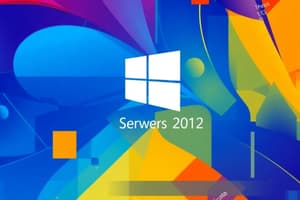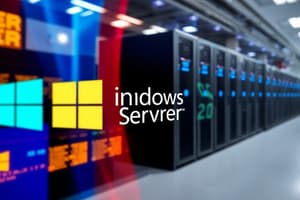Podcast
Questions and Answers
What is the primary function of a server operating system?
What is the primary function of a server operating system?
- Manage network resources and provide services (correct)
- Manage user interfaces
- Create applications
- Enhance internet speed
The Essentials Edition of Windows Server 2012/R2 is intended for large enterprises.
The Essentials Edition of Windows Server 2012/R2 is intended for large enterprises.
False (B)
Name one core technology of Windows Server 2012/R2.
Name one core technology of Windows Server 2012/R2.
Active Directory
A ______ is a software component that manages and monitors virtual machines.
A ______ is a software component that manages and monitors virtual machines.
Which edition of Windows Server 2012/R2 allows unlimited virtual instances?
Which edition of Windows Server 2012/R2 allows unlimited virtual instances?
Match the following editions of Windows Server 2012/R2 to their target audience:
Match the following editions of Windows Server 2012/R2 to their target audience:
Active Directory manages user authentication and resources in a Windows Server environment.
Active Directory manages user authentication and resources in a Windows Server environment.
What is the purpose of the DNS server role in Windows Server 2012/R2?
What is the purpose of the DNS server role in Windows Server 2012/R2?
What is the primary function of a DHCP server in a Windows Server environment?
What is the primary function of a DHCP server in a Windows Server environment?
Adding a second domain controller can improve fault tolerance and load balancing for authentication services.
Adding a second domain controller can improve fault tolerance and load balancing for authentication services.
What is a member server in a Windows domain?
What is a member server in a Windows domain?
Feature on Demand in Windows Server 2012/R2 allows the removal of unused feature installation ________ to save disk space.
Feature on Demand in Windows Server 2012/R2 allows the removal of unused feature installation ________ to save disk space.
Match each Windows Server role with its primary use:
Match each Windows Server role with its primary use:
What is a read-only domain controller (RODC)?
What is a read-only domain controller (RODC)?
A patch and a service pack are the same thing.
A patch and a service pack are the same thing.
List three hardware considerations for installing Windows Server 2012/R2.
List three hardware considerations for installing Windows Server 2012/R2.
The maximum number of times a server typically restarts during the installation process of Windows Server 2012/R2 is __________.
The maximum number of times a server typically restarts during the installation process of Windows Server 2012/R2 is __________.
Why is it important to set the correct time zone during server installation?
Why is it important to set the correct time zone during server installation?
Match the following features to their descriptions:
Match the following features to their descriptions:
When should you avoid using a Server Core installation?
When should you avoid using a Server Core installation?
Server activation is necessary to ensure compliance with licensing requirements.
Server activation is necessary to ensure compliance with licensing requirements.
What feature allows users to access their desktops from any internet connection in a private cloud?
What feature allows users to access their desktops from any internet connection in a private cloud?
Dynamic Access Control in Windows Server 2012/R2 does not take user attributes into account when granting file access.
Dynamic Access Control in Windows Server 2012/R2 does not take user attributes into account when granting file access.
What are the two fault-tolerance features supported by Windows Server 2012/R2?
What are the two fault-tolerance features supported by Windows Server 2012/R2?
The _______ role in Windows Server 2012/R2 allows a server to be configured as a VPN server.
The _______ role in Windows Server 2012/R2 allows a server to be configured as a VPN server.
What is a key difference between Datacenter Edition and Standard Edition in Windows Server 2012/R2?
What is a key difference between Datacenter Edition and Standard Edition in Windows Server 2012/R2?
Match the following components with their functions:
Match the following components with their functions:
Assigning a static IP address to a server is important for consistent access to network services.
Assigning a static IP address to a server is important for consistent access to network services.
What does the Server Manager in Windows Server 2012/R2 provide?
What does the Server Manager in Windows Server 2012/R2 provide?
Study Notes
Introducing Windows Server 2012/R2
- Windows Server 2012/R2 is designed to manage network resources and provide services such as authentication, data storage, and application hosting.
- There are four editions of Windows Server: Datacenter, Standard, Essentials, and Foundation.
- Essentials Edition is intended for small businesses, supporting up to 25 users.
- A "server core" installation is a minimal installation of Windows Server 2012/R2 without a graphical user interface (GUI), designed for improved performance and security.
- Virtualization enables running multiple operating systems on a single physical server using virtual machines (VMs).
- Active Directory in Windows Server 2012/R2 provides centralized authentication, authorization, and user/resource management.
- A VM simulates a physical computer, executing an operating system and applications as if it were a real machine.
- Public clouds are delivered by third-party providers over the internet while private clouds are managed internally.
- Core technologies in Windows Server 2012/R2 include Server Manager, Active Directory, and Microsoft Management Console (MMC).
- Hypervisors are software components that manage and monitor virtual machines on a host computer.
- The Dynamic Host Configuration Protocol (DHCP) server automatically assigns IP addresses.
- Active Directory Certificate Services (AD CS) creates, issues, and manages digital certificates.
- The Datacenter Edition of Windows Server 2012/R2 offers unlimited virtual instances.
- The DNS server role translates domain names into IP addresses.
- Virtual Desktop Infrastructure (VDI) permits users to access their desktop from any internet connection in a private cloud.
- RAID (Redundant Array of Independent Disks) and load balancing are two fault-tolerance features in Windows Server 2012/R2.
- A domain controller manages network resource access, authenticates users, and enforces security policies within a domain.
- IP Address Management (IPAM) monitors, manages, and audits DHCP and DNS servers.
- Server Manager provides a central interface for managing server roles, diagnosing issues, and configuring servers.
- Distributed File System (DFS) simplifies file access and management by organizing shared folders into a single namespace.
- The Datacenter Edition of Windows Server 2012/R2 allows for unlimited virtual instances, unlike the Standard Edition which allows only two.
- Server Core is a streamlined installation option for servers without a GUI.
- The Remote Access role allows a server to be configured as a VPN or DirectAccess server for secure remote access.
- Dynamic Access Control offers more granular access control to files based on attributes and properties.
- PowerShell cmdlets are lightweight commands used for various management tasks.
Installing Windows Server 2012/R2
- A clean installation of Windows Server 2012/R2 is performed on a new disk partition, not an upgrade from a previous version.
- Assigning a static IP address ensures consistent access to network services without changes in the server's address.
- Planning considerations for a Windows Server 2012/R2 installation involve hardware requirements, server roles, network protocols, and IP addressing.
- A read-only domain controller (RODC) holds a read-only version of the Active Directory database.
- CPU architecture, RAM size, and disk subsystem capabilities are crucial hardware components for installing Windows Server 2012/R2.
- Patches, applied through Windows Update, fix bugs and security issues.
- Service packs are a collection of patches and updates, while a patch addresses a specific problem.
- Setting the correct time zone during installation is important as it affects user authentication and task scheduling.
- Server Core installation reduces resource usage by eliminating the GUI and non-essential features.
- TCP/IPv4 and TCP/IPv6 are installed by default during a Windows Server 2012/R2 installation.
- Server Core is beneficial in branch office environments due to its reduced resource usage and enhanced security through remote management.
- Server Core installations should be avoided for servers requiring unsupported roles or if the administrator is not familiar with command-line tools.
- A Windows Server 2012/R2 installation typically restarts twice during the process.
- Windows Deployment Services (WDS) simplifies network-based Windows OS installations.
- After installation, server administrators configure settings, implement server roles, and manage updates and security.
- The default password requirements for the Administrator account after installation demand a minimum of three characters including uppercase, lowercase, numbers, and special symbols.
- Server activation ensures licensing compliance and full functionality.
- Feature on Demand allows removing unused installation files to save disk space.
- Adding a second domain controller improves fault tolerance and load balancing for authentication and other services.
- A DHCP server automatically assigns IP addresses and configuration settings to client devices.
- Windows Server 2012/R2 enhances network security through roles like Active Directory, DNS, and Dynamic Access Control.
- Virtualization extensions improve Hyper-V performance by optimizing VM support.
- Planning for company growth ensures scalability and prevents server overload when adding new servers.
- Hyper-V creates and manages virtual machines for testing, development, and production environments.
- A member server is part of a domain but does not have the domain controller role installed.
Studying That Suits You
Use AI to generate personalized quizzes and flashcards to suit your learning preferences.
Related Documents
Description
This quiz explores the features and editions of Windows Server 2012/R2. Key topics include server configurations, Active Directory management, and virtualization concepts. Gain a deeper understanding of how this server operating system can manage network resources effectively.




